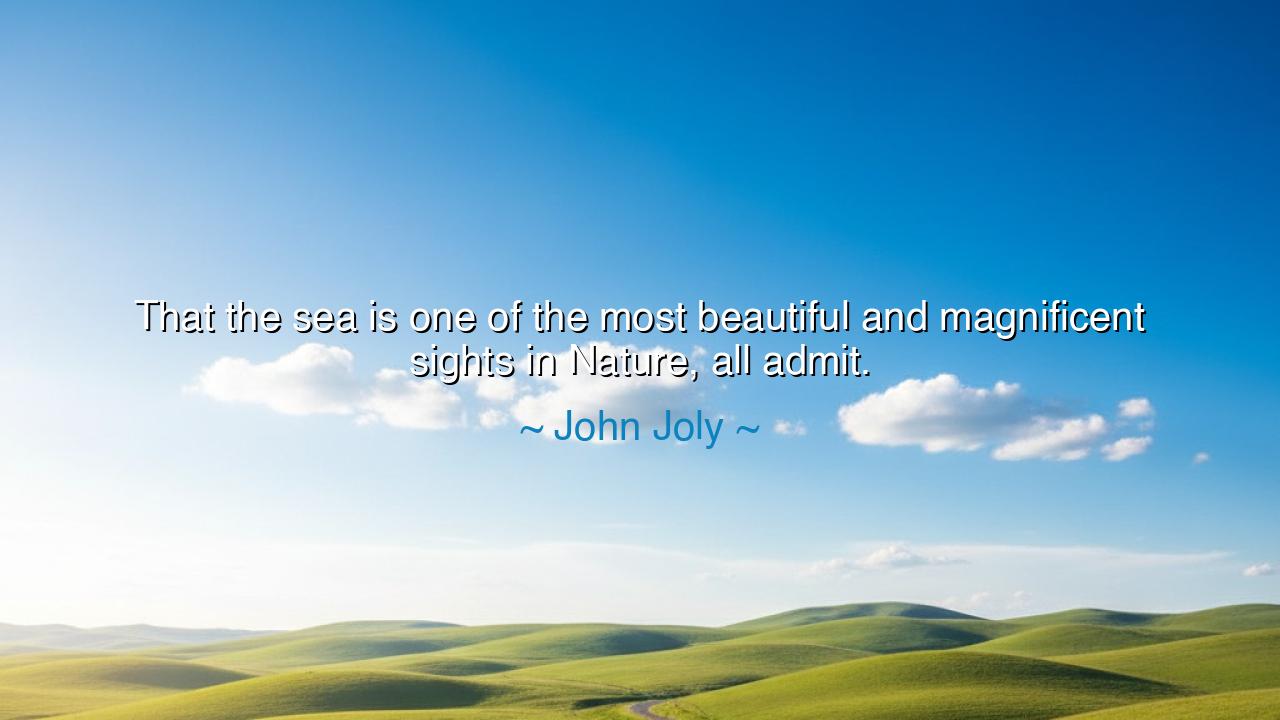
That the sea is one of the most beautiful and magnificent sights






The Irish scientist and philosopher John Joly, contemplating the vastness of creation, declared: “That the sea is one of the most beautiful and magnificent sights in Nature, all admit.” With these words, he touched upon a truth as ancient as mankind’s first gaze upon the horizon. The sea, in its immensity, awakens awe in every soul that beholds it. It is the mirror of heaven’s moods: calm as glass beneath a golden dawn, furious and raging beneath the blackened storm. To stand upon its shore is to stand before eternity itself, where the known world ends and the infinite begins.
The beauty of the sea is not like the beauty of a flower, delicate and fleeting; it is a beauty that terrifies as much as it inspires. It is the rolling hymn of creation, the living voice of the earth. Nations have risen and fallen upon its waves, and still it remains, unmoved by human striving. To behold the sea is to behold majesty clothed in blue and silver, in foam and thunder. Thus, Joly’s words are not mere poetry but an acknowledgment of universal agreement—for no man, whether prince or peasant, has denied the sea’s magnificence.
Throughout history, men have ventured upon the waves not only for conquest or trade, but for the encounter with mystery. Recall the story of Odysseus, tossed upon the wide Aegean, who met both beauty and terror upon the waters. The sea tested his courage, sharpened his mind, and broke his pride, yet it also brought him homeward to love and destiny. Such is the double nature of the ocean: it is teacher and tormentor, destroyer and deliverer. Its magnificence lies not only in its sight, but in its power to shape the souls of those who dare to face it.
Even in our own age, the sea has been a stage for great trials. Consider Ernest Shackleton and his men, trapped amid the Antarctic’s frozen seas. Surrounded by ice, betrayed by the waves, yet carried upon the ocean’s vast breast to eventual rescue, they bore witness to both the cruelty and the majesty of the waters. Shackleton himself spoke of the almost spiritual presence he felt in those desolate seas, as though the infinite had drawn near. The sea, in its grandeur, had both broken and preserved them, leaving behind not despair, but reverence.
Joly’s insight also stirs us to reflect on our own lives. For the sea is more than water and salt; it is symbol and teacher. It reminds us of our smallness in the face of creation, yet also of our capacity for wonder. It humbles the arrogant who believe the earth is theirs to command, and it lifts the weary who long for something greater than the dust of daily toil. When the human spirit grows restless, it is the ocean’s horizon that calls, promising that beyond what is seen lies a mystery worth pursuing.
What, then, is the lesson for us? It is this: cultivate awe. In an age where men grow blind from gazing only at their own inventions, turn again to the magnificent works of Nature. Stand before the sea, the mountain, the star-filled sky, and let them speak. Do not merely see them as objects for use or conquest, but as revelations of grandeur, as reminders that life is more than consumption and toil. The soul that forgets to wonder grows barren; but the soul that remembers awe grows deep as the ocean itself.
Practically, this means seeking moments of silence before the natural world. Walk upon the shore, not in haste, but in stillness, and let the sea instruct you in patience, resilience, and majesty. Let its tides teach you the rhythm of life: that loss and gain, retreat and advance, are but the eternal breathing of existence. And carry this lesson into your days, that you may live with dignity, humility, and courage.
Thus, when Joly spoke of the sea’s beauty and magnificence, he did not speak as one man but as the voice of humanity itself. For all admit it—yes, all!—that in the vastness of the sea, man is reminded of his origin, his destiny, and his place in the eternal order. And to those who would live wisely, let them learn from the waves: to be strong, to be humble, to be ever in awe of the greatness that lies beyond the grasp of mortal hands.






AAdministratorAdministrator
Welcome, honored guests. Please leave a comment, we will respond soon